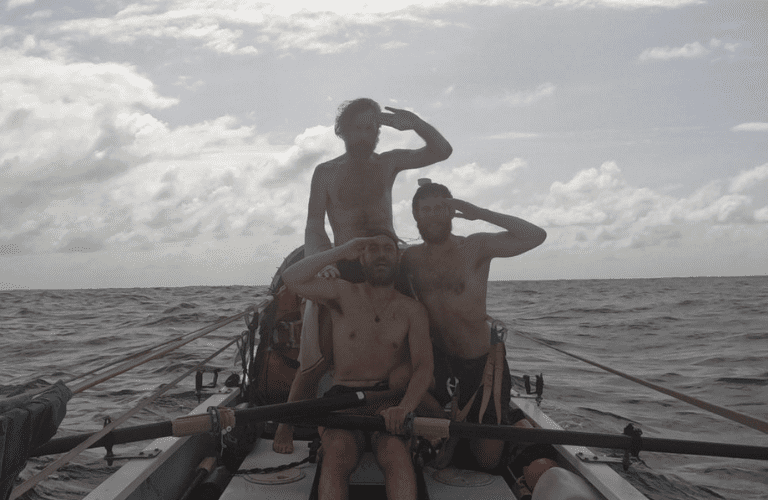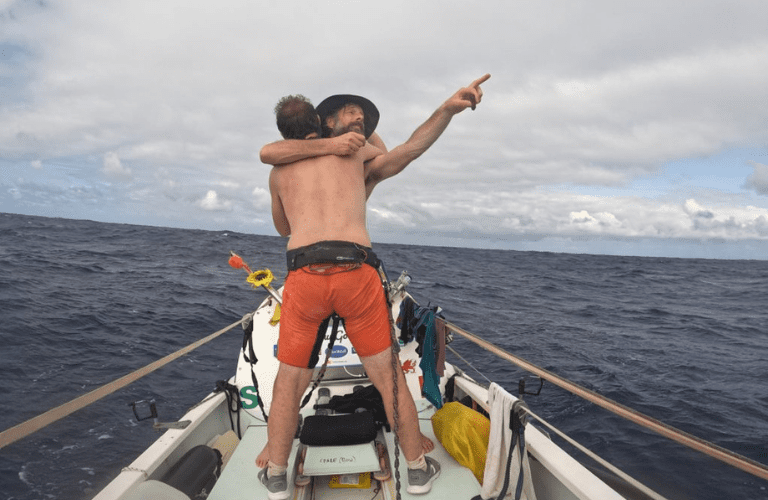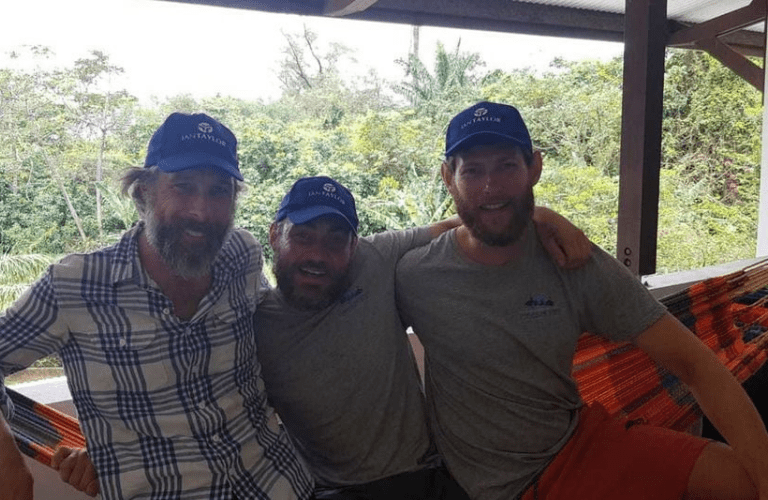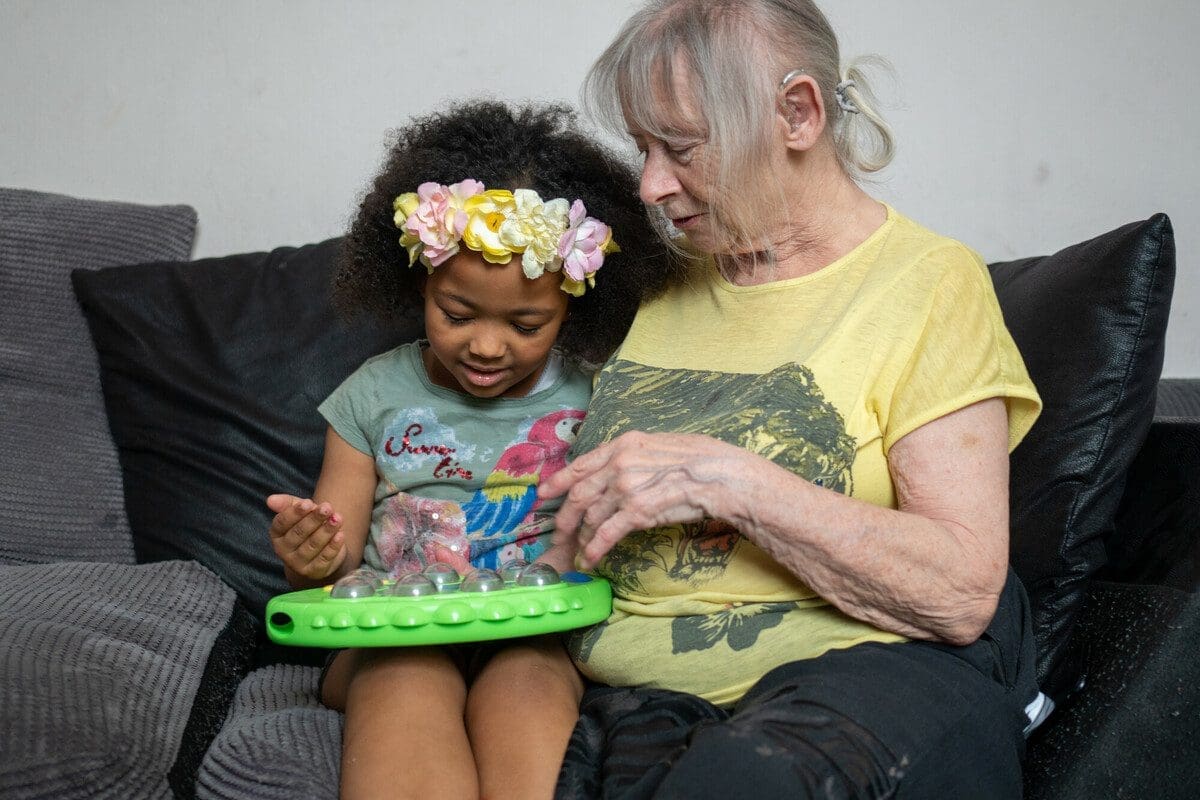
Take part in an event
Whether you run 10km, cycle for miles or trek up a mountain, you can take on a challenge and fundraise for families facing dementia.
Johnnie Ball, Dirk Von Delft and Stefan Vine rowed 4,000 miles across the Atlantic Ocean to raise funds for families facing dementia.

Johnnie Ball, Dirk Von Delft and Stefan Vine
Friends Johnnie, Dirk and Stefan were inspired to row the Atlantic for Dementia UK in memory of Johnnie’s dad, David, who was diagnosed with frontotemporal dementia when Johnnie was 15.
“In the beginning, my dad was aware of his condition and retained some fundamental faculties and understanding,” Johnnie explains. “But while he didn’t need round-the-clock care at this stage, the torment of living with the illness led to severe depression. It was incredibly tough for him and my mum, Fay.”
As David’s dementia progressed, Johnnie saw first-hand how difficult life is for family carers. “In the latter half of my dad’s illness, he became completely confused and anxious, requiring 24-hour care. My mum got no support or training, and had no carers to help with Dad,” he explains. “As a sole carer, there is never an end-of-shift and there is never downtime. There is no option but to stay at home and be on call every hour of every day and every night. It dominated my mum’s life for nearly two decades.”
Johnnie’s dad passed away in January 2018 in a specialist care home. “Throughout my dad’s journey, we didn’t know about dementia specialist Admiral Nurses – but they would have been the solution that we needed,” Johnnie says. “I wanted to do something to raise awareness of Dementia UK’s Admiral Nurse services so families in the same situation don’t have to face dementia alone.”
Knowing he wanted his challenge to be big and eye-catching, Johnnie started thinking about what it could be. “We wanted to do something memorable – something that would keep people excited and engaged,” he says.
“I enlisted two of my oldest friends, Dirk and Stef, to help me. Dirk is a free diver, kiteboarder, spearfisherman and cyclist, and Stef is a keen sailor and Sea Scout leader. In my spare time, I practice Olympic weightlifting, the martial art Muay Thai, kiteboarding and cycling. All three of us are adventurous, so I knew it was going to be something fairly extreme.”
Johnnie soon discovered that very few people had rowed from Europe to America – and they would be the first trio to do it. “It felt like a big enough challenge for us all to dig our teeth into – especially considering I suffer from terrible seasickness and Stef and I had never rowed before!” Johnnie explains.
And just like that, they decided to row from Portugal to South America to raise as much as they could for Dementia UK. This ambitious challenge would see the team rowing for a minimum of 12 hours a day, in shifts of two hours on, two hours off, seven days a week. They would have a maximum two hours’ sleep at a time for the duration of the voyage – and with no outside help, they would be completely self-sufficient.
“The first thing that springs to people’s minds when they think about a challenge like this is the physical preparation, but in a way, that was one of the easier parts of our prep,” Johnnie explains. “I used a rowing machine and started weight and mobility training to reduce the chance of injury, and we had plenty of rowing practice before the expedition itself.”
The team realised, however, that preparing mentally was going to be just as hard.
“Spending several months in cramped conditions with two other people was going to be tough. We needed to prepare ourselves for the mental toll this could take,” says Johnnie.
To learn how they could best approach this mammoth challenge as a team, the rowers enlisted the help of a psychologist and behaviourist, Michael Romeling.
“Each of us underwent detailed psychological profiling,” Johnnie says. “We needed to be able to have truly open conversations about who we were. We agreed in advance to be open and honest, not take things personally and not pass judgment on one another. This commitment helped us get to know each other on a deeper level and recognise what made us tick so we could spot and avoid any potential meltdowns at sea.

The team was amazed by how quickly they adapted to being at sea – but some things made them long for home.
“Only eating dehydrated food – that is something you don’t get used to!” says Johnnie. “We spoke a lot about food. Stef and I fantasised about steak and beer, while Dirk was dreaming of fish and white wine for his first meal on dry land.”
Other challenges included the constant seasickness and sleep deprivation – not to mention ‘nappy rash’ from sitting in saltwater-soaked boxers whilst rowing for 12 hours a day! “We all now have a new love for Sudocrem,” Johnnie laughs.
There were scary moments during the journey. “At one point, two or three weeks in, the waves were the biggest we’d seen, towering over us,” says Johnnie. “We were in some kind of microclimate that is permanently stormy due to the way the wind funnels through the islands. Waves were crashing overboard and the winds were tipping the boat at nearly 90 degrees. I remember feeling in danger, but when the adrenaline is coursing through your body you don’t have time to be scared as you’re so distracted. “
Of course, there were many breath-taking moments too. “I will always remember the surreal sight of bioluminescence – plankton that when stirred or agitated starts to glow and fluoresce,” Johnnie says. “It lit up like a glittering 70s dancefloor – like thousands of headtorches bobbing in the ocean.
“When we struck the surface with our oars, a volcano of yellow-green light erupted. This attracted some playful dolphins, who created a light show as they frolicked around us.”

As the team neared the end of their journey, they were joined by various seabirds. “We knew that we were nearing land as the birds we saw – noddies – don’t stray too far from their breeding grounds,” Johnnie explains. “It was a friendly reminder of how far we’d come, and how near we were to the finish line.”
Finally, after 65 days, the team reached French Guiana, on the North Atlantic coast of South America.
“Our legs stopped working and we collapsed onto the marina, where one of our sponsors kindly dropped off some pizza and beer!” Johnnie says. “We were then stranded until the next day as we waited for Customs, but we made friends with everyone on the marina who kept us going with coffee.
“And once we were on dry land, with our legs working a little better, we finally got that steak.”
The trio broke a world record with their Forget Me Knot row and raised over £45,000 for Dementia UK. Thank you, Johnnie, Stef and Dirk, for your incredible work, commitment and adventurous spirit!

Whether you run 10km, cycle for miles or trek up a mountain, you can take on a challenge and fundraise for families facing dementia.

Help us raise vital funds, improve care and support for families facing dementia and spread the word about our specialist dementia nurses.

Sharing your story with Dementia UK can help to inspire and reassure others who may be going through similar things.